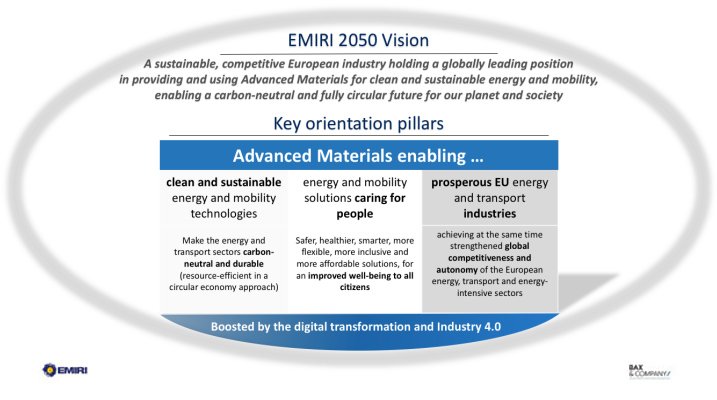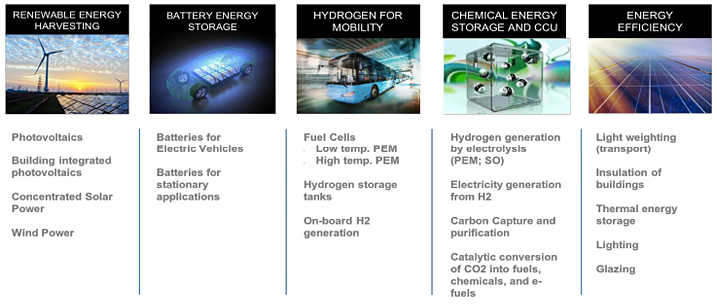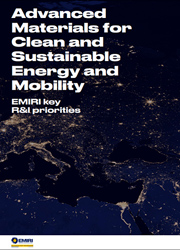Key R&I priorities are clear.
In the face of the 21st century's global climate and energy challenges, Europe's ambition is to become the leader in the transition to an economy that keeps growing within environmental and societal constraints.
The strategic directions set by the new President of the European Commission Ursula von der Leyen in 'A European Green Deal' confirm the willingness of the new European Commission to reinforce earlier ambitions such as the commitment of Europe to the Paris Agreement on Climate and position Europe at the forefront of sustainability. Addressing these objectives, in line with the ambitious timescales considered, will require breakthrough technologies and disruptive models at a scale and a pace never encountered before, that will transform our society in all activity sectors. The European energy and mobility sectors, which today generate about half of all GHG emissions, have already made significant steps; from energy harvesting to energy storage, as well as technologies that improve the energy efficiency and decarbonisation of end uses. The share of renewable energy has increased from 8.5% in 2005 to 17.5% in 2017 – enabled by harvesting and storage technologies – while energy efficiency of end-use sectors increased by 30% compared to 1990.
Achieving these ambitious targets will only happen by taking advantage of all possible technological options: better use of natural resources, re-use in a circular economy approach, increased use of renewable energy and feedstock, electrification of mobility and energy-intensive processes, new catalytic processes to re-use CO2, eco-designed materials... Overall, this requires further urge investments in Research and Innovation activities across all the Technology Readiness Levels (TRLs), with a particular emphasis on advanced materials – which represent up to 80% of the costs of the key components of clean and sustainable energy and mobility technologies. These investments will not only provide an environmental benefit but will also strengthen the economy – the RES and energy efficiency sectors employ more than 2 million people in the EU – and create a competitive advantage for Europe in a future where clean technologies are indispensable.

Advanced materials at the heart of clean techs
The advanced materials industry (Chemicals, Polymers, Metals and alloys, Glass, Ceramics, Composites...) is renowned as one of the leading technology sectors in Europe. It generates innovation that benefits society at large providing more than 2.5 million direct jobs (and around four times more in indirect jobs along the various value chains) and contributes to more than 650 billion euros of Europe's gross domestic product. Home to approximately 40.000 companies, European advanced materials industry plays a crucial role in serving society's need
for clean and sustainable energy and mobility in Europe, and all over the world. The impact of the industry on the broader European economy is significant and must be sustained. The advanced materials demand for clean energy and sustainable mobility is anticipated to grow continuously – even at a two-digits rate in specific applications like batteries – until 2050 and beyond, also satisfying an increasing request for safer, more affordable and environmentally friendly solutions. Industrial competition is fierce, not only from established world regions but also from new, strong challengers. In this context, there are vast amounts to be done in the research and innovation field to provide a differentiating competitive advantage for the EU in this market.
High-performance advanced materials are at the core of the technological innovations needed to reach a sustainable and climate-neutral economy and society. Such materials are a part of the solution to our global challenges, offering better performance in their use, at lower cost, resource and energy requirements, and improved sustainability at the end-of-life of the products. The development of these new materials has to manage the scarcity of resources and be part of a circular economy value chain which will contribute to Europe's competitiveness in a context of increased sustainability standards. With the imperative to change our energy technology mix, to respond to the challenge of decarbonisation and of the security of energy supply, research and innovation investments to improve the competitiveness, performances and environmental footprint of advanced materials for clean and sustainable energy and mobility technologies are more than ever needed for Europe to compete in the global market and support the delivery of a prosperous, modern, competitive and climate-neutral economy by 2050.

De-risking and accelerating the innovation | addressing the right priorities
History shows that it takes about 10 – 15 years of R&I activities before the required advanced materials are developed and are ready for market uptake. Together, the Industry & the European Commission need to partner up to accelerate the innovation in the field. While the EU has a strong position in research, a too-frequent extensive market uptake is due to long capital-intensive development times in combination with substantial technology and commercialization risks. These factors make it difficult for new materials to make the journey from the lab to industrial-scale production and the markets.
One of the key activities of EMIRI is to identify research and innovation areas where new advanced materials can make a difference in the clean and sustainable energy and mobility sectors. EMIRI will further on aid to lead the way for these early-stage technologies and materials to industry growth and market.
 Detailing the Advanced Materials challenges to tackle and the innovation approaches recommended, the 2nd edition of the EMIRI Technology Roadmap is
a reference for policy-makers in EU and its Member States co-designing Horizon Europe, for the industry as well as the research world. More than 100 experts from EMIRI's community contributed to building this new version of the EMIRI Technology Roadmap, which is available for download on EMIRI website or directly at http://bit.ly/2MeeaMa. All public and private stakeholders in European advanced materials, energy and mobility sectors are invited to consider the revised priorities set out in this document in their future research and innovation
programmes.
Detailing the Advanced Materials challenges to tackle and the innovation approaches recommended, the 2nd edition of the EMIRI Technology Roadmap is
a reference for policy-makers in EU and its Member States co-designing Horizon Europe, for the industry as well as the research world. More than 100 experts from EMIRI's community contributed to building this new version of the EMIRI Technology Roadmap, which is available for download on EMIRI website or directly at http://bit.ly/2MeeaMa. All public and private stakeholders in European advanced materials, energy and mobility sectors are invited to consider the revised priorities set out in this document in their future research and innovation
programmes.
Since 2012, EMIRI, the Energy Materials Industrial Research Initiative, is representing more than 50 organizations (industry, research, associations) active in advanced materials for clean and sustainable energy & mobility technologies. EMIRI contributes to industrial leadership of developers, producers and key users of advanced materials by shaping innovation, manufacturing and energy policy framework at European level.
Contact information:
EMIRI Aisbl
Rue de Ransbeek, 310, B-1120 Brussels
Telephone: +32 2 264 27 85
Email: info@emiri.eu
Website: https://emiri.eu/